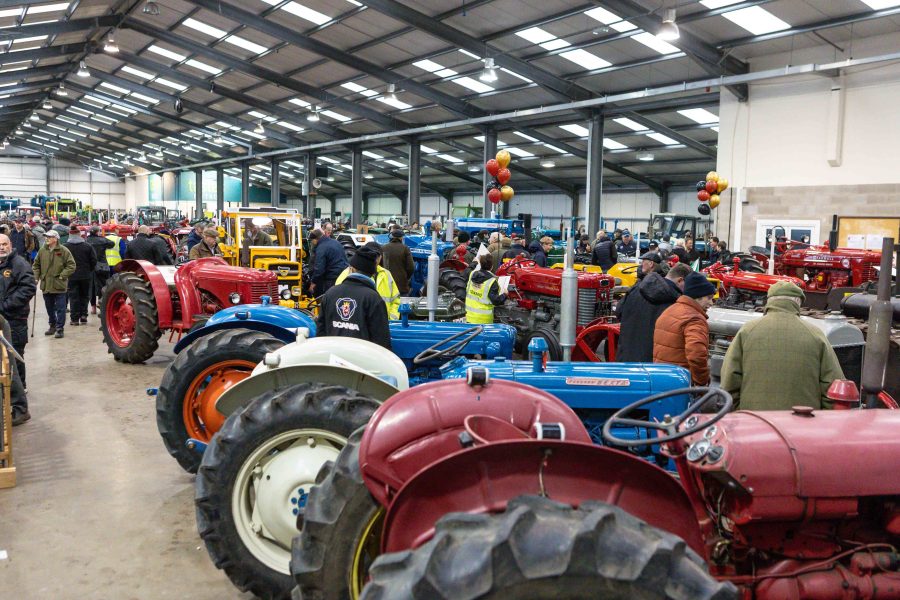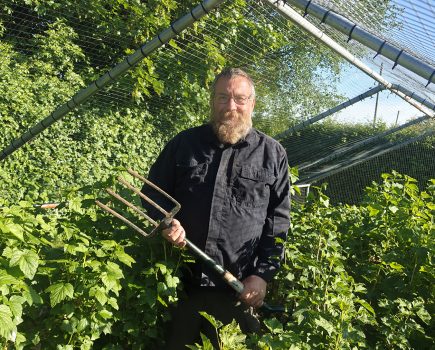The Newark Vintage Tractor & Heritage Show, held at Newark Showground on 9-10 November, will be celebrating the nation’s heavy plant machinery and historic sugar beet production.
A pioneer of heavy plant and construction machinery, Aveling-Barford has an undeniable legacy and a multi-generational following. Its beginnings were the result of a 1933 merger of British manufacturing giants, Aveling & Porter and Barford & Perkins.
In 1934, it introduced its first diesel engines, as well as supplying 75% of the UK’s road rollers by 1937, before producing its first shuttle dumper in 1939 – just before the outbreak of war. “During the Second World War, Aveling-Barford made a significant contribution, producing a large number of Bren Gun Carriers,” says Benjamin Hobster, a heavy plant mechanic and Aveling-Barford enthusiast. “Post-war, it resumed production of steam and diesel rollers, as well as other diesel-powered construction equipment.”
In 1946 Aveling-Barford opened an additional factory to manufacture lighter machines, introducing the G series diesel road rollers, followed in 1950 by the 4×4 Aveling Austin 99H motor grader – under licence from Austin Western. It subsequently introduced the RM grader – mounted on a Fordson tractor, and in 1958, its first purpose-built 4×4 rear-steer loader.
“Over the years, the company manufactured a catalogue of other equipment, including site dumpers, rigid and articulated dumper trucks, and small (calf) dozers,” adds Mr Hobster.
In 1967, the business became a part of British Leyland, before it was sold in 1988 to Wordsworth Holdings. In 2010, the company ceased production.
Mr Hobster will be exhibiting a two-tonne roller with a two-cylinder Lister SR2 diesel engine at this year’s show. “I bought it in 2017 for around £160 – completing its restoration in 2021. All the bodywork was rotten and while the gears and steering mechanism had seized – it did run.
“Some parts have been hard to come by but it’s as close to an original as I can get.”
Another focus of the show will be the mechanical evolution behind the sugar beet industry – which originally ran on manpower as much as it did machine. A popular crop in Europe in the early 1900s, Dutch farmer Johannes van Rossum travelled to the UK to contract farms to grow for him. And in 1912, he built a sugar beet factory in Cantley, Norfolk.
But it was World War One which put home-grown sugar into focus due to import shortages, and by 1928 a further 17 factories had been built – including one in Newark.
The industry relied on manual labour well into the 1950s – but the mechanics of production were starting to evolve, influenced by John Deere in the US, and the progressive European industry. “Standen Engineering is a big name in the development of beet machinery,” says Charlie Wright, arable farmer and show committee member.
“But in the 1970s there were also contractors designing and building their own kit – Malcolm Rumley was one, he built a two-row self-propelled harvester. However, European growers were leaps and bounds ahead, with self-propelled, six-row machines in the field.”
Mr Wright will be showcasing some of his family farm’s collection, including a late 1940s Standen Challenger – a single-row, trailed and tractor-powered lifter loader, bought in the 1980s in original condition.
He also has a Standen Rapide Tanker Mk3A harvester, complete with Opel wheels and two-tonne capacity tank. “My father, Brian, bought it in the early 1990s to save it from scrap,” he says. “It was one of the last to be built, and it was barely used.”
Leigh Granger, vice chair at the Peterborough Farm Machinery Preservation Society (PFMPS), will also be participating with a rare piece of Belgian-built machinery. “We’ve got a 1968 Frandon hoe fitted to a 1966 International B275 tractor,” he says. “We believe there were only three made, so it’s possible it is the only one remaining.”
Originally salvaged by an ex British Sugar worker, PFMPS saved the piece in 2020 when it was once again at risk of scrap. “Michael Sly at Park Farms, Thorney, agreed to storing it with his collection,” notes Leigh. “Between our members and Park Farm employees the hoe was recommissioned.”
Tickets to the Newark Vintage Tractor and Heritage Show are available at newarkvintagetractorshow.ticketsrv.co.uk/tickets/30
To receive regular copies of The Country Smallholder magazine featuring more news like this, subscribe here.
For FREE updates from the world of smallholding, sign up for The Country Smallholder newsletter here.








